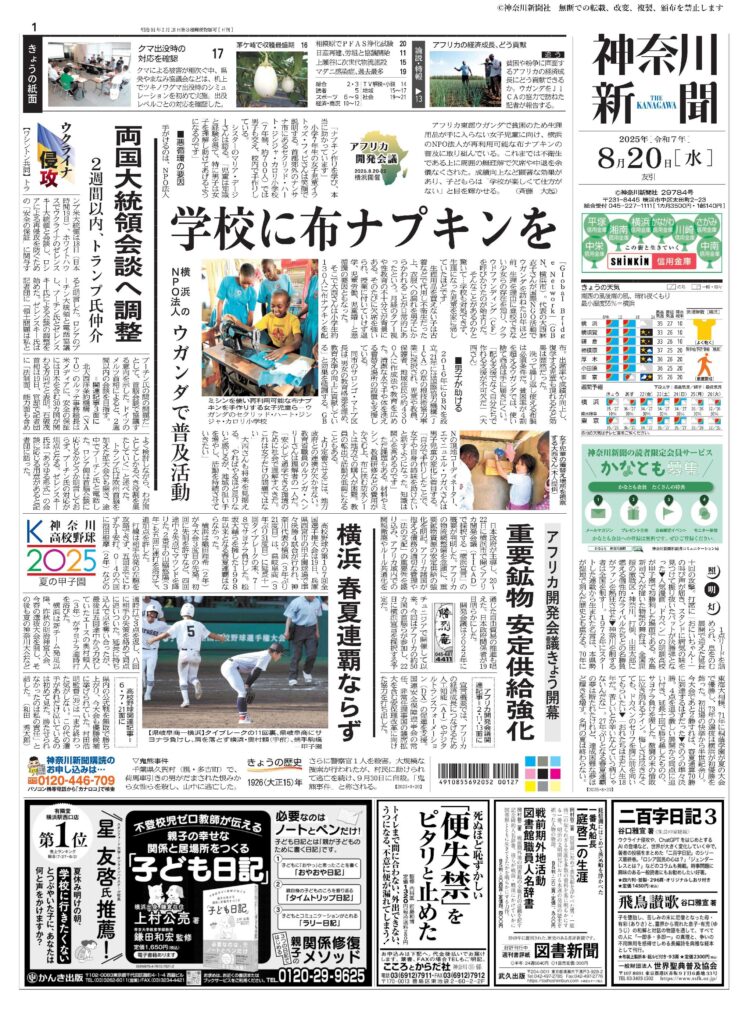In conjunction with the 2025 Tokyo International Conference on African Development (TICAD) held in Yokohama, GBN’s activities were featured in an article in the Kanagawa Newspaper.
This coverage was made possible thanks to the generous support of many individuals, including interviews with GBN Ōnishi, on-site visits, and the cooperation of JICA staff and journalists.
Despite the limited space, the article beautifully conveyed the passion of GBN and our local members, as well as the essence of our work.
<English translation follows below↓↓↓>

chat GPT’s English translation ↓
Promoting Reusable Cloth Sanitary Pads for Schoolgirls in Uganda
— Yokohama-based NGO Tackles Poverty and Menstrual Health
In Uganda, East Africa, many schoolgirls cannot afford sanitary products due to poverty. A Yokohama-based nonprofit organization is working to spread the use of reusable cloth sanitary pads to support these girls. In the past, lack of hygiene and social stigma often forced them to miss school or drop out, contributing to child labor. The initiative has shown remarkable results, such as improved academic performance, with some children saying, “School has become so much fun that I can’t wait to go.”
“Learning how to make sanitary pads has been a huge help for me,” said Philby Iratuz, a 7th grader at Sacred Heart Jinja Karoli Primary School in Nansana, a suburb of Kampala, Uganda’s capital.
At the school, both boys and girls participate in a club where they learn to hand-make sanitary pads using sewing machines.
Sister Maria Daisy emphasized: “Children are gaining knowledge and skills. Especially the boys—by joining, they learn to understand and support the girls.”
Concerns Over a Vicious Cycle
The initiative is run by Global Bridge Network (GBN), a nonprofit based in Yokohama City. Around ten years ago, GBN’s representative Maiko Ohnishi visited Uganda through international NGO activities. She discovered that many girls were unable to attend school during menstruation. Shocked by this reality, she launched a crowdfunding campaign to introduce cloth sanitary pads.
“I was surprised that such a situation even existed. Schools couldn’t cope either—some even sent menstruating students home,” Ohnishi recalled.
Girls who could not afford sanitary products used old clothes as substitutes, which were unhygienic and prone to leakage. This often led to teasing from boys. Each incident caused girls to skip school, fall behind academically, drop out, and eventually be pushed into child labor or early marriage. Deep-rooted taboos and insufficient sex education worsened the problem.
Ohnishi first distributed cloth pads to about 130 elementary students. The results were immediate—attendance improved, academic performance rose, and some dropouts even returned to school.
The reusability of cloth pads is key. In Uganda, where over 40% of the population lives in poverty, disposable products are unaffordable. “What’s needed is not handouts, but support that enables people to make products themselves,” said Ohnishi.
In 2016, she established GBN and began full-scale activities. In 2021, the project was adopted by the Japan International Cooperation Agency (JICA). Through this initiative, about 4,300 children, teachers, parents, and community members received education on pad-making and menstruation. The program also supported the installation of washrooms where students could bathe and change clothes with clean water.
Boys’ Participation Matters
GBN’s efforts, continuing for over a decade, have taken root locally. Salongo Matovu, the mayor of Nansana City, highlighted the impact: “This initiative is helping to close the gender gap in education and is raising overall education standards.”
GBN’s local coordinator, Emmanuel Waggaba, pointed out the change among boys: “By making the pads themselves, boys have started saying they want to help girls and even their own sisters. Knowledge sparks interest and compassion.”
Challenges remain, however—securing budgets for pad-making, purchasing sewing machines, and teacher training. Waterproof lining, an essential material for the pads, is hard to obtain in rural areas. If a teacher in charge is transferred, activities can slow down, making collaboration with local governments essential.
Henry Luwanga, an official at the Ministry of Education, is one of the supporters: “This is not just a girls’ issue. Communities need to understand the importance of ensuring a safe environment where students can attend school during menstruation.”
Ohnishi admitted, “The more we do, the more we realize it’s still not enough. We want to strengthen collaboration with local communities, increase local leaders, and continue this work.”